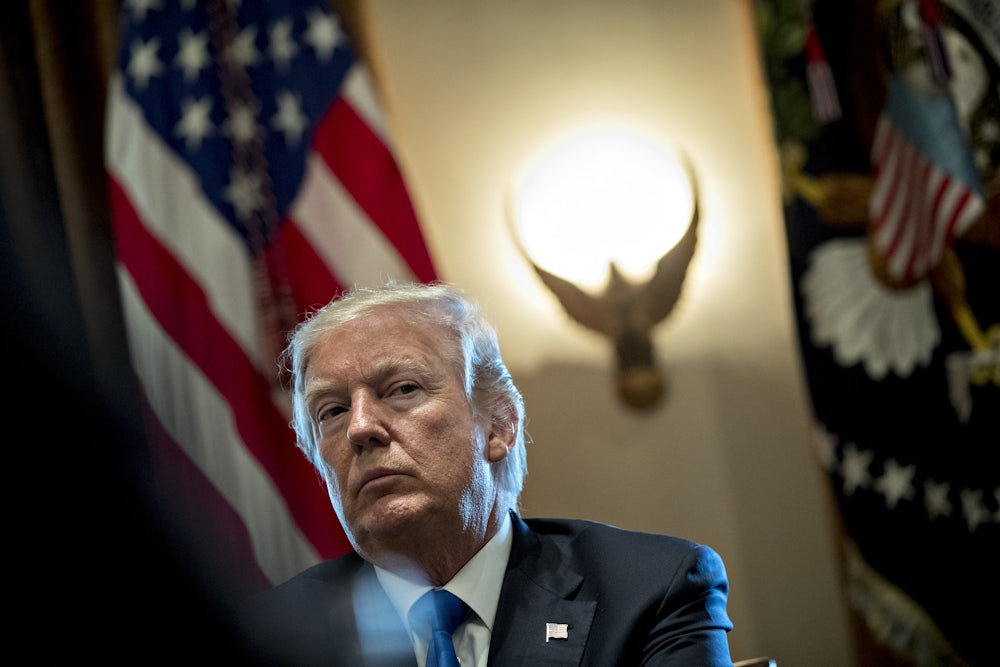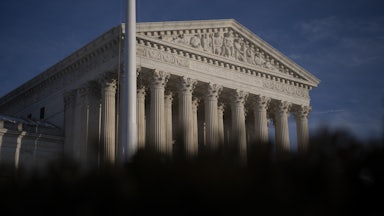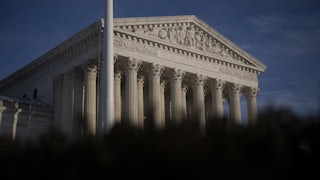President-elect Donald Trump has wanted to end birthright citizenship for almost a decade. He first called for its elimination in 2015, telling reporters on the campaign trail that he wanted to “test it out” in the courts. His desire went unfulfilled during his first term in office, but it looks like he may finally get a chance in his second one.
The New York Times reported on Monday that, as part of its imminent mass deportation plan, Trump’s policy team “plans to stop issuing citizenship-affirming documents, like passports and Social Security cards, to infants born on domestic soil to undocumented migrant parents in a bid to end birthright citizenship.”
It is worth clarifying what exactly this means. The Trump administration would not be “ending” birthright citizenship by taking those steps. It would instead make it far more difficult for the children of undocumented parents to later prove that they are U.S. citizens if that citizenship is challenged in court. The Constitution, not the Department of Homeland Security, is what automatically makes people born on U.S. soil into American citizens.
The legal and constitutional reality is that Trump cannot actually end birthright citizenship on his own. But he seems keen on forcing a case that would potentially give the courts an opportunity to do it for him, perhaps through manipulating the documentary process. Succeeding would require the Supreme Court to rewrite the Fourteenth Amendment and overturn almost two centuries of precedents—something it’s already shown a willingness to do.
Any discussion of birthright citizenship begins with the most infamous case in Supreme Court history. Dred Scott, an enslaved Black man, sued for his freedom in federal court in 1853. He argued that because he had been taken to the Wisconsin Territory, where slavery was not legal, he had thus become a free man upon his arrival there. The dispute reached the Supreme Court four years later in 1857.
Chief Justice Roger B. Taney, writing for a 7–2 majority, used the opportunity to try to “settle” the national debate over slavery in slavery’s favor. To that end, he struck down the Missouri Compromise and opened the western territories to slaveholding, declaring that the federal government had no power to forbid it there on due process grounds. Taney quashed Scott’s case by additionally proclaiming that no person of African descent could ever be a U.S. citizen, leaving Scott without standing to bring the case.
Taney’s ruling precipitated the Civil War and, ultimately, the abolition of slavery itself. The Reconstruction-era Congress had extended citizenship to Black Americans by legislation by 1866, but faced with growing intransigence in the South, sought to secure it even further. The Fourteenth Amendment’s citizenship clause declared that “all persons born or naturalized in the United States, and subject to the jurisdiction thereof, are citizens of the United States and of the state wherein they reside.”
It is worth emphasizing just how categorical this language is. The sole exception mentioned in the clause—“subject to the jurisdiction thereof”—is a reference to two groups of people: children born to foreign diplomats stationed in the United States and Native Americans whose tribal nations were considered to be separate sovereigns outside U.S. jurisdiction. Congress eliminated the latter category in 1924 by passing the Indian Citizenship Act, which effectively cemented the closing of the American frontier.
The Supreme Court confirmed the modern scope of birthright citizenship in 1898. Wong Kim Ark, a Chinese American man, had been born in San Francisco in 1873 to Chinese-born parents. Wong’s parents were not U.S. citizens themselves as federal naturalization law at that time did not allow Chinese immigrants to attain U.S. citizenship. He traveled to and from China a few times in the 1890s before he was eventually detained and denied entry under the Chinese Exclusion Act.
In a 6–2 decision, the high court ruled that Wong was indeed a U.S. citizen and could not be denied reentry. It held that he was neither the child of Chinese diplomats nor, obviously, a member of a Native American tribe. Accordingly, Wong had acquired U.S. citizenship at the moment of his birth on American soil, and the Chinese Exclusion Act did not apply to him. That ruling remains the defining one for citizenship clause cases to this day.
The ultimate question in most debates about Trump’s power is a familiar one: Would the Supreme Court approve of it? On demolishing birthright citizenship, the best and most likely answer is no. None of the Supreme Court justices have suggested that they would like to revisit Wong Kim Ark’s constitutionality—not even Justice Clarence Thomas, who otherwise has a laundry list of precedents he would like to overturn.
The justices have also resisted efforts to trivialize the value of citizenship in recent cases. In the 2017 case Maslenjak v. United States, for example, the court unanimously blocked the federal government from denaturalizing a woman who had fled Yugoslavia in the 1990s but lied to immigration officers about her husband’s whereabouts during the wars there. The justices held that her “immaterial” false statements while obtaining refugee status were not sufficient to reverse her completed naturalization process, especially since she was otherwise eligible for it.
At oral arguments in that case, Chief Justice John Roberts mocked a Justice Department lawyer who suggested that naturalized U.S. citizens could be denaturalized for not telling immigration officials when they had driven over the speed limit, even if they weren’t arrested. “Oh, come on,” he scoffed. The Maslenjak case dealt with denaturalization, not birthright citizenship, so it would not be a direct precedent in a Trump-related challenge. But it is reflective of how the court has traditionally viewed attempts to undermine U.S. citizenship’s integrity with deep skepticism.
The caveats here are Trump v. Anderson and Trump v. United States, the two landmark cases on disqualification and immunity that the high court ruled on earlier this year. The president-elect has already seen the Supreme Court’s current members go out of their way to twist law and precedent for his personal benefit. In Anderson, the disqualification ruling, the justices even unanimously gutted an entire section in the Fourteenth Amendment to shield Trump from legal consequences. If Trump wants to now force a fight on a different provision of that amendment, one can hardly blame him for thinking he might actually have a chance to prevail.
The mood in the lower courts may also be changing. Judge James Ho, whom Trump named to the Fifth Circuit Court of Appeals in his first term, became famous in the late 2000s for a law review article in which he made an originalist case for birthright citizenship. “Nothing in text or history suggests that the drafters intended to draw distinctions between different categories of aliens,” he wrote, using the legal term for noncitizens. “To the contrary, text and history confirm that the Citizenship Clause reaches all persons who are subject to U.S. jurisdiction and laws, regardless of race or alienage.”
Now he appears to have qualified that unequivocal answer. In a recent interview with conservative law professor Josh Blackman, Ho suggested that there might be an atextual exception for the children of undocumented migrants and compared their parents to suspected terrorists held at Guantánamo Bay.
Birthright citizenship is supported by various Supreme Court opinions, both unanimous and separate opinions involving Justices Scalia, Thomas, Alito, and others. But birthright citizenship obviously doesn’t apply in case of war or invasion. No one to my knowledge has ever argued that the children of invading aliens are entitled to birthright citizenship. And I can’t imagine what the legal argument for that would be. It’s like the debate over unlawful combatants after 9/11. Everyone agrees that birthright citizenship doesn’t apply to the children of lawful combatants. And it’s hard to see anyone arguing that unlawful combatants should be treated more favorably than lawful combatants.
This does not really hold true if one thinks about it for more than a few minutes. The presence of undocumented immigrants in the United States does not amount to an “invasion” in any legal sense. Additionally, the Supreme Court decided the Wong Kim Ark case while the Chinese Exclusion Act was still in force. Newspapers at the time referred to large-scale Chinese immigration to the West Coast as an “invasion,” reflecting a deep, broad strain of anti-Chinese rhetoric. Originalist legal scholars have also criticized Ho for adding an exception to the citizenship clause that does not exist in its text.
One would like to think that the Supreme Court is above such flimsy motivated reasoning. The justices, more than anyone, should be all too aware of the harm that comes when the high court undermines the integrity of U.S. citizenship. Trump thinks he can persuade them to reject the plain text of the Constitution, the original public meaning of the Fourteenth Amendment, and multiple generations of settled precedent. The lives and destinies of millions of people will hang in the balance.










